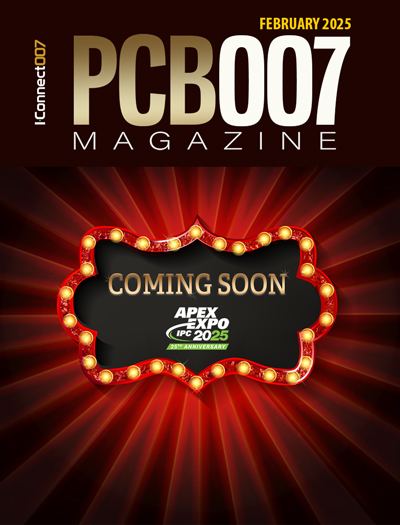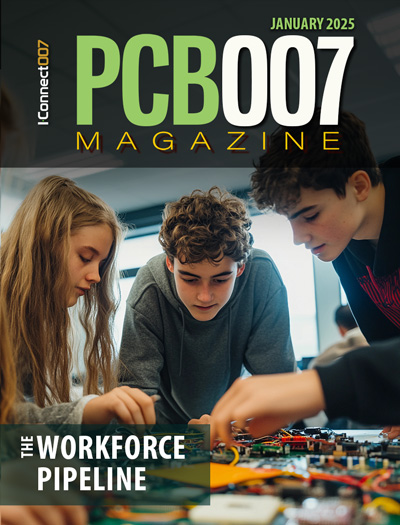-

- News
- Books
Featured Books
- pcb007 Magazine
Latest Issues
Current Issue
It's Show Time!
In this month’s issue of PCB007 Magazine we reimagine the possibilities featuring stories all about IPC APEX EXPO 2025—covering what to look forward to, and what you don’t want to miss.

Fueling the Workforce Pipeline
We take a hard look at fueling the workforce pipeline, specifically at the early introduction of manufacturing concepts and business to young people in this issue of PCB007 Magazine.

Inner Layer Precision & Yields
In this issue, we examine the critical nature of building precisions into your inner layers and assessing their pass/fail status as early as possible. Whether it’s using automation to cut down on handling issues, identifying defects earlier, or replacing an old line...
- Articles
- Columns
Search Console
- Links
- Media kit
||| MENU - pcb007 Magazine
Underconstraining Your Materials? Leave It to the Experts
May 30, 2024 | I-Connect007 Editorial TeamEstimated reading time: 1 minute
With traditional laminates now sporting improved resin systems, some OEMs are choosing various flavors of FR-4 instead of high-speed laminates for their high-speed designs—even RF applications. Avoiding overconstraining your materials in high-speed products can lead to considerable cost savings, not to mention a more streamlined trip through fabrication.
But what do designers and design engineers need to know before they start using traditional PCB laminates for RF applications? Raytheon’s Filbert Arzola is a principal electrical engineer, IPC instructor, and a big advocate of setting constraints correctly early in the design cycle. We caught up with him at IPC APEX EXPO when his Professional Development Course on constraints was taking a lunch break.
Andy Shaughnessy: It seemed fitting to talk with you here in Anaheim during your class on constraining your high-speed board correctly. Tell us a little about the class.
Filbert Arzola: Sure. One of the things we've learned is that some high-speed designers have, in the past, put too much focus on materials that had a certain glass weave. We went through so much waste trying to use glass weave at a certain angle. We had so much trouble getting a board done that we've gone to other material types, adding dielectric to them just to make things work better. I learned there are certain kinds of material and FR-4 materials, including one that, even though it's not the best, still gives a good end-product. The end product is what matters.
Kelly Dack: There's no question that consistency in materials, manufacturing, and performance is key. What are the elements of consistency in your opinion?
Arzola: You need to even be able to get the materials, and not just on time. Let's say you call a vendor and say, “I'm going to build these boards six months from now; can you make sure the material is there?” They'll say, “Sure, material availability is okay.” Then they go out and buy the material. But now, six months later, the material may be outdated with respect to the requirements we want to meet, and we can't use that material. So, that's a big deal.
To read this entire conversation, which appeared in the May 2024 issue of Design007 Magazine, click here.
Suggested Items
Flexible Thinking Flexible Circuit Technology—Looking Back and Forward
03/03/2025 | Joe Fjelstad -- Column: Flexible ThinkingFlexible circuit technology came on the scene as a solution largely for niche applications, however, the technology has emerged in recent years as a cornerstone of modern electronics. Today, the technology is enabling a broad range of new product designs across industries. From wearable devices and medical implants to foldable smartphones and numerous automotive applications, flexible circuits are arguably at the heart of much of the next generation of innovations.
China's New Critical Mineral Restrictions Will Cause Disruption Across Defense, Renewable Energy, Electronics and Manufacturing
02/25/2025 | PRNewswireExiger released proprietary research generated by its AI platform 1Exiger predicting the impacts of China's new export restrictions on tungsten, tellurium, bismuth, indium, and molybdenum. Exiger's research finds that the defense, renewable energy, electronics, and manufacturing sectors are particularly vulnerable to supply delays, material shortages, price increases, and supply bottlenecks.
Electronics Industry Demand Rises in February
02/21/2025 | IPCOrders, capacity utilization, and backlogs all increased in the past month, pushing electronics industry demand higher according to IPC’s February Sentiment of the Global Electronics Manufacturing Supply Chain Report.
Mycronic to Showcase its Full-line Solution at IPC APEX EXPO 2025
02/21/2025 | MycronicMycronic, the leading Sweden-based electronics assembly solutions provider, continues to respond to growing customer demand by offering high-flexibility and high-productivity solutions.
EIPC 2025 Winter Conference, Day 2: A Roadmap to Material Selection
02/20/2025 | Pete Starkey, I-Connect007The EIPC 2025 Winter Conference, Feb. 4-5, in Luxembourg City, featured keynotes and two days of conference proceedings. The keynote session and first-day conference proceedings are reported separately. Here is my review of the second day’s conference proceedings. Delegates dutifully assembled bright and early, well-rested and eager to participate in the second day’s proceedings of the EIPC Winter Conference in Luxembourg.


